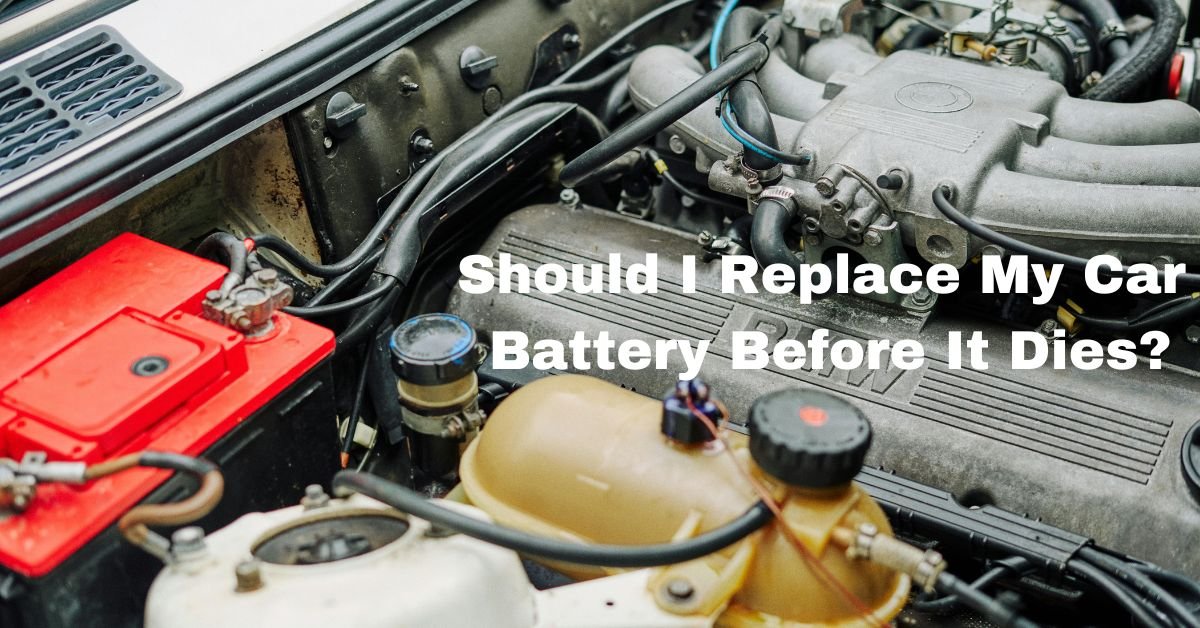Car batteries are necessary to maintain the smooth operation of your car. They power everything from the ignition system to electrical components, ensuring that your car starts reliably every time you turn the key. But, like all car parts, the battery has a finite lifespan, and eventually, it will need to be replaced. The big question, however, is whether you should replace your car battery before it actually dies. Let’s take a closer look at this issue and explore whether preemptively replacing your car battery is a good idea.
Should I Replace My Car Battery Before It Dies?
1. Understanding the Lifespan of a Car Battery
Most car batteries last between 3 to 5 years, depending on the make, model, and how well you maintain your vehicle. However, factors like weather conditions, driving habits, and the number of short trips you take can influence the life of your battery. In hot climates, for example, extreme heat can cause the battery to degrade faster, while in colder regions, the battery may fail due to the cold temperatures.
Your battery’s capacity to retain a charge declines with age. While your battery may still function, it could be on borrowed time. This is when many car owners begin to wonder whether they should replace their battery before it gives out completely.
2. The Risks of Waiting Too Long
Waiting until your car battery dies can lead to unwanted and costly problems. A battery failure can happen at the most inconvenient times, leaving you stranded with no way to start your car. Depending on where you are when it happens, this can lead to unnecessary stress, frustration, and even unsafe situations. If your battery dies while driving, it can cause the vehicle’s electrical systems to fail, leading to loss of power steering or braking capabilities, which could be hazardous.
Moreover, a sudden battery failure could also damage other parts of your vehicle. A dead battery could cause a power surge that harms delicate electrical components, leading to costly repairs. Replacing the battery before it dies completely can prevent such issues from arising.
3. Signs That Your Battery Is Dying
Rather than waiting for the battery to fail entirely, you can look out for some warning signs that it may be time for a replacement. These signs include:
- Slow Engine Crank: If your car takes longer than usual to start or the engine cranks slowly when you try to start the car, it could be a sign that the battery is losing its charge.
- Dim Lights or Electrical Issues: If you notice that your headlights or dashboard lights are dimming, or if other electrical components in your car are acting erratically, this could be a sign of a failing battery.
- Check Engine or Battery Light: Modern cars are equipped with sensors that monitor the health of the battery. If the “check engine” or “battery” warning light appears on your dashboard, it could be a sign that your battery is not functioning properly.
- Corrosion or Leaks: If you notice a white, chalky substance around the battery terminals, this could be corrosion caused by the battery’s age. Leaks from the battery itself can also be a sign that it’s time to replace it.
- Old Age: If your battery is approaching the 3 to 5-year mark, even if it hasn’t shown any obvious symptoms, it may still be wise to consider a replacement.
Must Read: Is Sports Car Faster With Or Without Traction Control?

4. Benefits of Replacing Your Battery Before It Dies
- Avoiding Inconvenience: Replacing your car battery before it dies eliminates the risk of getting stranded or dealing with unexpected breakdowns. You can plan for a replacement when it’s most convenient for you.
- Maintaining Your Vehicle’s Performance: A new battery ensures that your vehicle’s electrical systems operate at full capacity. This can help prevent issues like dimming lights, difficulty starting, or malfunctioning electrical components.
- Cost Savings in the Long Run: While replacing your battery early might seem like an added expense, it could actually save you money in the long run. A failing battery could damage other components, leading to higher repair costs. Additionally, being proactive means you can take advantage of discounts or sales on battery replacements.
- Peace of Mind: Knowing that your battery is in good condition allows you to drive with confidence, without worrying about it suddenly failing when you need your car most.
5. When to Replace Your Battery
While some car owners may choose to replace their battery early, the optimal time for a replacement often depends on its age and condition. If your battery is over 3 years old and showing signs of wear, it’s a good idea to replace it. If you’ve noticed any of the warning signs listed above, don’t wait until it’s too late—take your car to a mechanic or an auto parts store to have it tested and replaced if necessary.
Conclusion
So, should you replace your car battery before it dies? The answer is yes, in many cases. While it might seem like an unnecessary expense, replacing your battery before it fails can save you time, money, and stress. Regularly monitoring the condition of your battery and looking for signs of wear and tear can help you make an informed decision. Ultimately, by staying proactive and replacing your battery when necessary, you can keep your car running smoothly and avoid unexpected headaches down the road.
